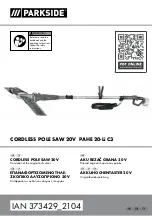
6
- Pay attention to the environment. Avoid unnecessary throttle operation for
less pollution and noise emissions. Adjust the carburetor correctly.
- During or after operation, do not put the hot equipment onto dry grass or
combustible materials.
- Do not hold your right hand above shoulder height.
- During operation, never hit the saw chain against hard obstacles such stones
and nails. Take particular care when cutting branches next to walls, wire
fences or the like.
- If branches get caught in the saw chain, always stop the engine and remove
the spark plug cap. Otherwise unintentional start may cause serious injury.
- If the saw chain becomes clogged, always stop the engine and remove the
spark plug cap before cleaning.
- Accelerating the engine with the saw chain blocked increases the load and
will damage the engine and/or clutch.
- Before cutting limbs, keep an escape area away from the falling limb. First,
clear obstructs such as limbs and branches from the work area. Move all
tools and goods from the escape area to another safe place.
- Before cutting branches and limbs, check the falling direction of them,
considering the condition of branches and limbs, adjoining trees, wind
direction, etc. Pay full attention to the falling direction, and the rebound of the
branch, which hit the ground.
- Never hold the pole saw at an angle of more than 60°. Otherwise falling
objects can hit the operator and cause serious injury. Never stand underneath
the limb being cut.
- Pay attention to broken or bent branches. They may bounce back in cutting,
causing unexpected injury.
- Before cutting limbs that you intend to cut, remove branches and leaves
around them. Otherwise the saw may be caught by them.
- To prevent the saw from being caught in the kerf, do not release the throttle
lever before pulling the saw out of the kerf.
- If the saw chain is bound in the kerf, immediately stop the engine, carefully
move the branch to open the kerf and release the saw.
- Avoid kickback (rotational reactive force towards the operator). To prevent
kickback, never use the guide bar nose or perform a penetrating cut. Always
beware of the position of the guide bar nose.
- Check the chain tension frequently. When checking or adjusting the chain
tension, stop the engine and remove the spark plug cap. If the tension is
loose, tighten it.
- Operate the equipment with as little noise and contamination as possible. In
particular check the correct setting of the carburetor.
- Never stand on a ladder and run the equipment.
- Never climb up into trees to perform cutting operation.
- Wait until the chain reaches its full working speed before cutting.
- Take a rest to prevent loss of control caused by fatigue. We recommend to
take a 10 to 20-minute rest every hour.
Transport
- Before transporting the equipment, switch off the engine and remove the
spark plug cap.
-
Always fit the guide bar cover during transportation.
- Always use the tool protection included with the equipment.
-
Carry it in a horizontal position by holding the shaft. Keep the hot muffler
away from your body.
- When transporting the equipment in a vehicle, properly secure it to avoid
turnover. Otherwise fuel spillage and damage to the equipment and other
baggage may result.
- Shut off the engine during transport.
- Ensure that the fuel tank is completely empty.
- When unloading the equipment from the truck, never drop the engine to the
ground or this may severely damage the fuel tank.
- Remember to lift the entire equipment from the ground when moving the
equipment. Dragging the fuel tank is highly dangerous and will cause damage
and leakage of fuel, possibly causing fire.







































